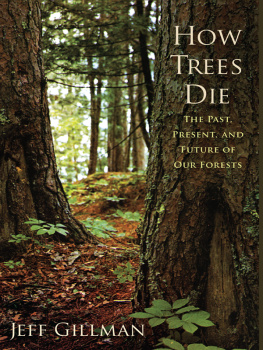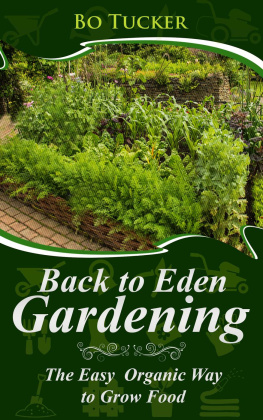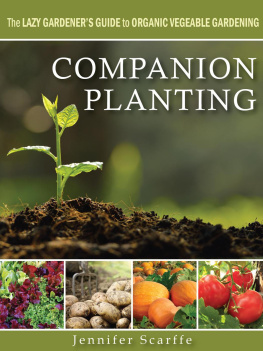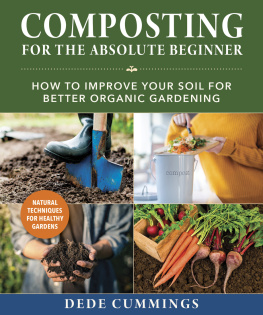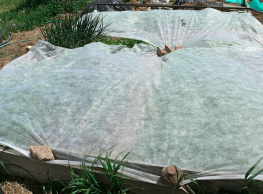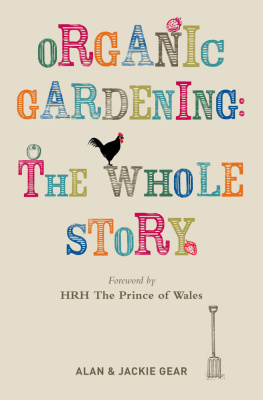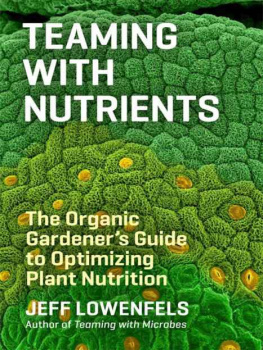Praise for The Truth About Organic Gardening:
Destined to be a bestseller.... An easy to read, practical, and fascinating book.
Cleveland Plain Dealer
How do you separate the hype from the facts? Spending 13 bucks on Gillmans new book... may go a long way.
The Washington Post
The main thrust of Gillmans book is to advise gardeners to exercise common sense and think first about the implications of their actionsbefore they begin ravaging the environment for the sake of a few flowers.
The Milwaukee Journal Sentinel
Gillmans research can help you save time, money, effort, and the environment.
The Monterey County Herald
Takes a hard look at some products and practices we consider organic.
The South Florida Sun-Sentinel
This book plays an important role in debunking the black/white oversimplifications about organic as good and synthetic as bad.
GardenRant.com
THE Truth ABOUT Organic Gardening
BENEFITS, DRAWBACKS, AND THE BOTTOM LINE
Jeff Gillman

Mention of trademark, proprietary product, or vendor does not constitute a guarantee or warranty of the product by the publisher or author and does not imply its approval to the exclusion of other products or vendors. Reasonable efforts have been made to publish reliable data and information, but the author and publisher cannot assume responsibility for the validity of all materials and for the consequences of their use.
Copyright 2008 by Jeff Gillman. All rights reserved.
Published in 2008 by Timber Press, Inc.
The Haseltine Building
133 S.W. Second Avenue, Suite 450
Portland, Oregon 97204-3527
www.timberpress.com | 2 The Quadrant
135 Salusbury Road
London NW6 6RJ
www.timberpress.co.uk |
Printed in the United States of America
Second printing 2008
Library of Congress Cataloging-in-Publication Data
Gillman, Jeff, 1969
The truth about organic gardening: benefits, drawbacks, and the
bottom line / Jeff Gillman.
p. cm.
Includes bibliographical references and index.
ISBN-13: 978-0-88192-862-4
1. Organic gardening. 2. Agricultural pestsControl. I. Title.
SB453.5.G54 2008
635.0484dc22
2007022076
A catalog record for this book is also available from the British Library.
For Clare and Catherine

Contents
Preface
Everyone likes to pick sides. In politics youre either a Republican, a Democrat, or a stealing votes from people who can actually win Independent. In sports youre for the team I like or youre against it, and lets not even bother discussing religion, where the consequences of choosing incorrectly are so grave that one may prefer not even to contemplate the possibility of being wrong. Thank goodness that we who inhabit the relaxed world of the garden can find respite and avoid such infernal bickering. No one will ever tell us how to grow our plants. We can do as we please, enjoying experimentations with a new color scheme, a new plant variety, or a different pruning technique, and never hear a nasty word from our neighbors and friends. Yes, its all quite sublime among those who grow and enjoy plantsthat is, until you start to have problems and decide to spray a pesticide or apply a fertilizer. Then everyone seems to want to pass judgment.
Gardeners, both those who grow things for a living and those who grow things for fun, are generally a well-educated group who understand the workings of Mother Nature as well as anyone you can name. And, realizing this, they tend to have strong opinions about how Mother Nature should be treated. Unfortunately, these opinions are not always in tune with those of other gardeners. One group will claim that the only way to grow something properly is to grow it as it would grow naturally, so they provide nothing that they consider unnatural to their plants, forgoing all fertilizers, pesticides, and sometimes even plastic containers. Another group of gardeners will provide things to help their plants grow, but only those things that they construe as natural. Fertilizers are fine as long as they come from a once-living thing, as are pesticides as long as they arent made in a lab. And finally, another group of gardeners, one much maligned by the other two, will add anything to their plants if they think it will keep them healthy, never mind the source.
Its unfortunate that in a society thats becoming more and more informed by the day, most of the information youll find on gardening is written by people who reside so firmly in one of these three schools of thought that theyre unable to see beyond their biases and into the truth behind the practices they use and recommend. I wrote this book to help the gardener, the weekend farmer, and the educated consumer see beyond dogma and into the truth behind different gardening practices, organic or otherwise.
Acknowledgments
A number of people deserve to be recognized for the help they provided with this book. My family has been very supportive and understanding of my preoccupation with working on it, as have the good people at the University of Minnesota. Chad Giblin deserves credit for brainstorming bits of this book and always providing a critical voice regarding my ideas. A second critical voice was that of Lois Braun, a fair-minded and deep-thinking graduate student who has taught me much more than I could ever teach her. Thanks to Lorraine Anderson for her thorough reading and careful criticism.
1
Organic Basics
When I read books, especially those that deal with issues that might be considered controversial in any way, I find it useful to understand the background of the person who wrote the book. So in the interest of fairness I think its only appropriate that you understand a little bit about my background and what I believe about growing plants naturally, or organic gardening.
I was raised in southeastern Pennsylvania, where my family owned a four-acre orchard that we lived on. (Actually the parcel of land was thirteen acres, but most of this land was rented out to a local farmer who grew hay and corn on it.) We grew peaches, apples, apricots, plums, and pears at various times, and at the times when the orchard was most productive, my father, a research chemist by trade, applied synthetic pesticides, such as Sevin and oil, to the trees. Later on, when the kids got older, he stopped spraying so much, preferring to spend his weekends doing things like family travel and working on his motorcycle collection, but thats a different story. In years when he didnt apply chemicals our fruit yields were greatly reduced and I remember digging maggots out of apples with my pocket-knife so that I could eat them (the applesnot the maggots). This was such a common occurrence that I remember being quite surprised when some visiting relatives werent interested in eating these apples that doubled as insect motels. There can be no doubt that living on that small orchard prevented me from becoming a particularly picky eater, but it also led me to believe that to produce fruit, at least fruit that my relatives would eat, you had to apply pesticides.
When I went to graduate school to study entomology and horticulture I was taught both chemical and cultural means of pest control, as most students who study agriculture are, and I quickly found that chemical control provided the more satisfying, albeit short-lived, results, while cultural controls usually worked well over the long term but were rather disappointing in terms of quick results. As a graduate student and research assistant I had the opportunity to participate in projects and experiment with many different pest control methods, from experimental insect trapping to synthetic pesticide use.
Next page

